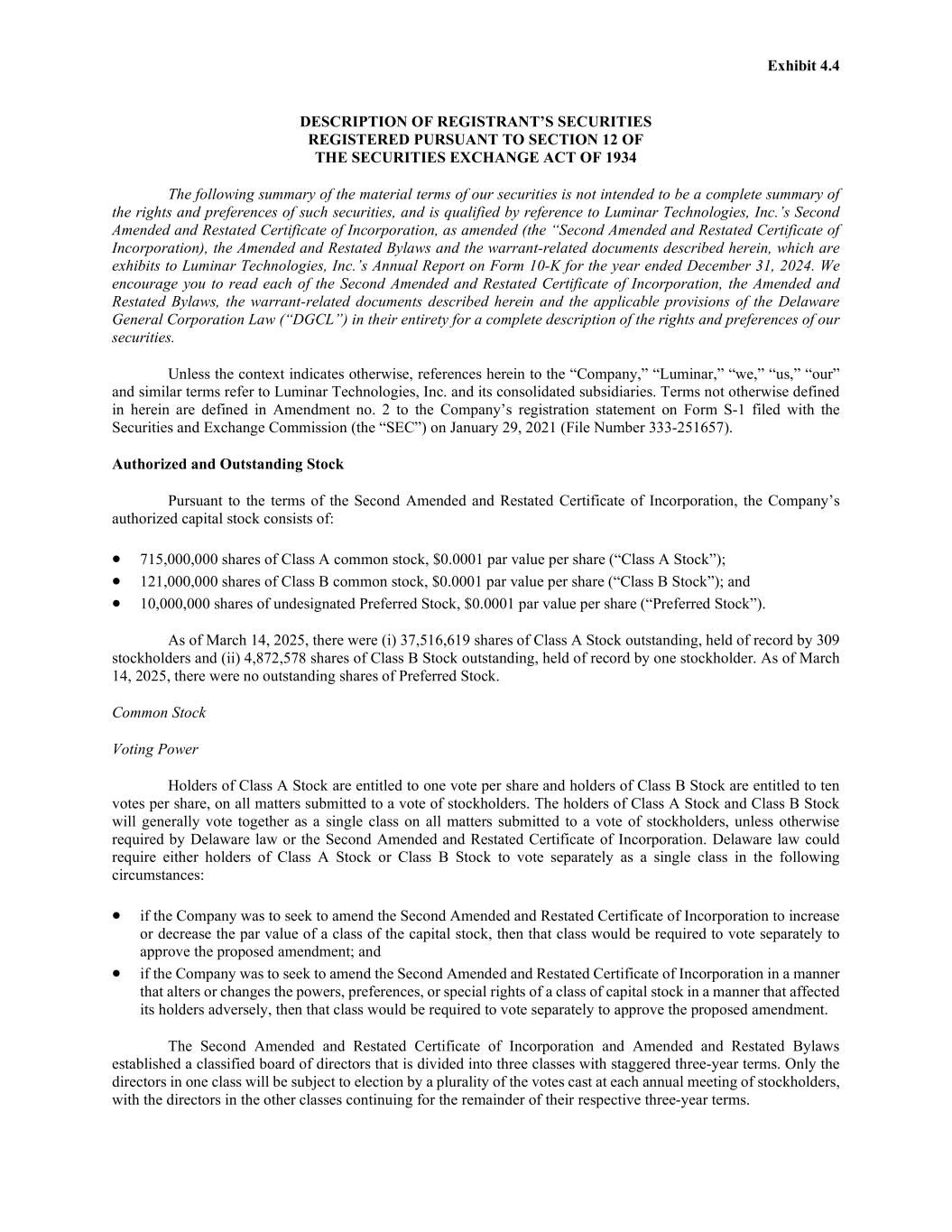
Exhibit 4.4 DESCRIPTION OF REGISTRANT’S SECURITIES REGISTERED PURSUANT TO SECTION 12 OF THE SECURITIES EXCHANGE ACT OF 1934 The following summary of the material terms of our securities is not intended to be a complete summary of the rights and preferences of such securities, and is qualified by reference to Luminar Technologies, Inc.’s Second Amended and Restated Certificate of Incorporation, as amended (the “Second Amended and Restated Certificate of Incorporation), the Amended and Restated Bylaws and the warrant-related documents described herein, which are exhibits to Luminar Technologies, Inc.’s Annual Report on Form 10-K for the year ended December 31, 2024. We encourage you to read each of the Second Amended and Restated Certificate of Incorporation, the Amended and Restated Bylaws, the warrant-related documents described herein and the applicable provisions of the Delaware General Corporation Law (“DGCL”) in their entirety for a complete description of the rights and preferences of our securities. Unless the context indicates otherwise, references herein to the “Company,” “Luminar,” “we,” “us,” “our” and similar terms refer to Luminar Technologies, Inc. and its consolidated subsidiaries. Terms not otherwise defined in herein are defined in Amendment no. 2 to the Company’s registration statement on Form S-1 filed with the Securities and Exchange Commission (the “SEC”) on January 29, 2021 (File Number 333-251657). Authorized and Outstanding Stock Pursuant to the terms of the Second Amended and Restated Certificate of Incorporation, the Company’s authorized capital stock consists of: 715,000,000 shares of Class A common stock, $0.0001 par value per share (“Class A Stock”); 121,000,000 shares of Class B common stock, $0.0001 par value per share (“Class B Stock”); and 10,000,000 shares of undesignated Preferred Stock, $0.0001 par value per share (“Preferred Stock”). As of March 14, 2025, there were (i) 37,516,619 shares of Class A Stock outstanding, held of record by 309 stockholders and (ii) 4,872,578 shares of Class B Stock outstanding, held of record by one stockholder. As of March 14, 2025, there were no outstanding shares of Preferred Stock. Common Stock Voting Power Holders of Class A Stock are entitled to one vote per share and holders of Class B Stock are entitled to ten votes per share, on all matters submitted to a vote of stockholders. The holders of Class A Stock and Class B Stock will generally vote together as a single class on all matters submitted to a vote of stockholders, unless otherwise required by Delaware law or the Second Amended and Restated Certificate of Incorporation. Delaware law could require either holders of Class A Stock or Class B Stock to vote separately as a single class in the following circumstances: if the Company was to seek to amend the Second Amended and Restated Certificate of Incorporation to increase or decrease the par value of a class of the capital stock, then that class would be required to vote separately to approve the proposed amendment; and if the Company was to seek to amend the Second Amended and Restated Certificate of Incorporation in a manner that alters or changes the powers, preferences, or special rights of a class of capital stock in a manner that affected its holders adversely, then that class would be required to vote separately to approve the proposed amendment. The Second Amended and Restated Certificate of Incorporation and Amended and Restated Bylaws established a classified board of directors that is divided into three classes with staggered three-year terms. Only the directors in one class will be subject to election by a plurality of the votes cast at each annual meeting of stockholders, with the directors in the other classes continuing for the remainder of their respective three-year terms.
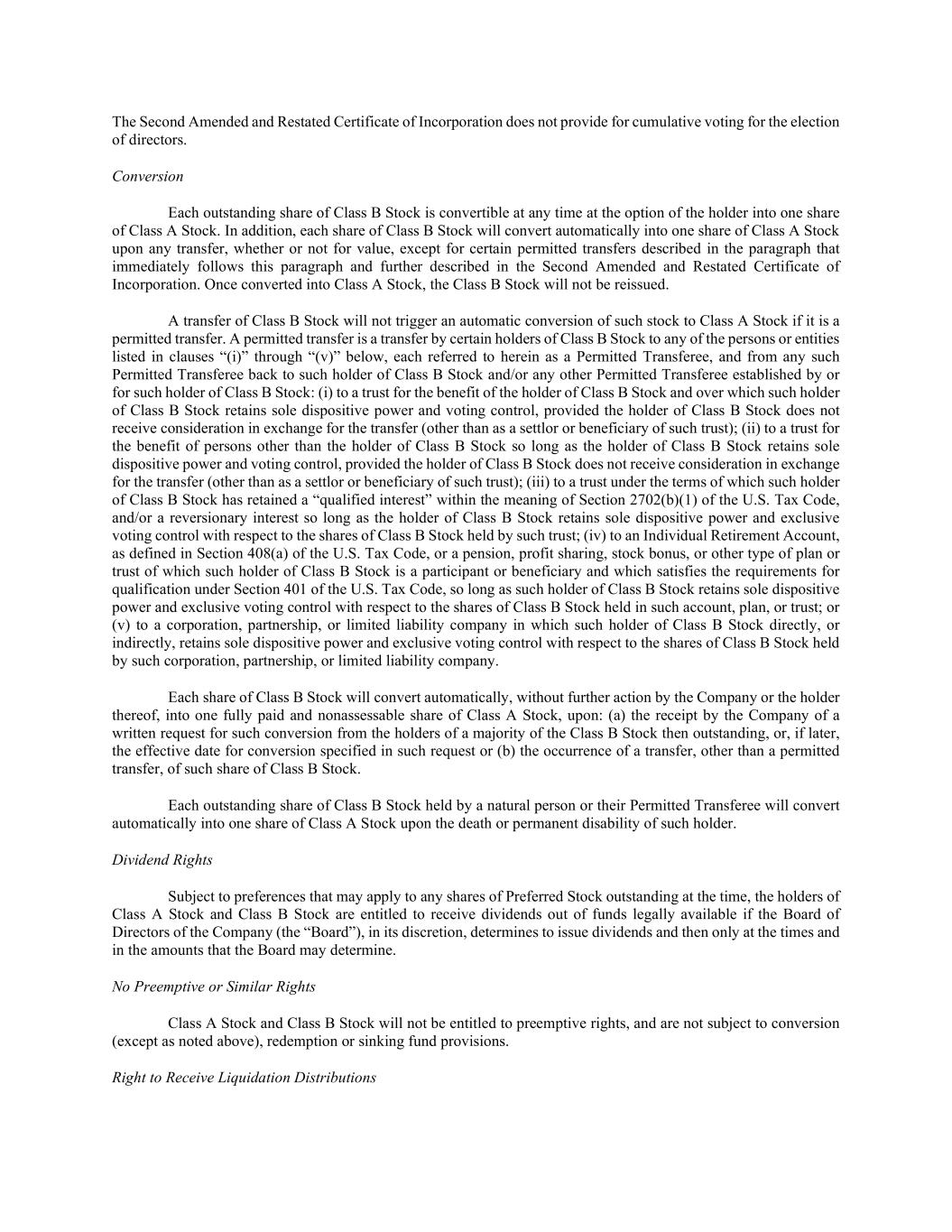
The Second Amended and Restated Certificate of Incorporation does not provide for cumulative voting for the election of directors. Conversion Each outstanding share of Class B Stock is convertible at any time at the option of the holder into one share of Class A Stock. In addition, each share of Class B Stock will convert automatically into one share of Class A Stock upon any transfer, whether or not for value, except for certain permitted transfers described in the paragraph that immediately follows this paragraph and further described in the Second Amended and Restated Certificate of Incorporation. Once converted into Class A Stock, the Class B Stock will not be reissued. A transfer of Class B Stock will not trigger an automatic conversion of such stock to Class A Stock if it is a permitted transfer. A permitted transfer is a transfer by certain holders of Class B Stock to any of the persons or entities listed in clauses “(i)” through “(v)” below, each referred to herein as a Permitted Transferee, and from any such Permitted Transferee back to such holder of Class B Stock and/or any other Permitted Transferee established by or for such holder of Class B Stock: (i) to a trust for the benefit of the holder of Class B Stock and over which such holder of Class B Stock retains sole dispositive power and voting control, provided the holder of Class B Stock does not receive consideration in exchange for the transfer (other than as a settlor or beneficiary of such trust); (ii) to a trust for the benefit of persons other than the holder of Class B Stock so long as the holder of Class B Stock retains sole dispositive power and voting control, provided the holder of Class B Stock does not receive consideration in exchange for the transfer (other than as a settlor or beneficiary of such trust); (iii) to a trust under the terms of which such holder of Class B Stock has retained a “qualified interest” within the meaning of Section 2702(b)(1) of the U.S. Tax Code, and/or a reversionary interest so long as the holder of Class B Stock retains sole dispositive power and exclusive voting control with respect to the shares of Class B Stock held by such trust; (iv) to an Individual Retirement Account, as defined in Section 408(a) of the U.S. Tax Code, or a pension, profit sharing, stock bonus, or other type of plan or trust of which such holder of Class B Stock is a participant or beneficiary and which satisfies the requirements for qualification under Section 401 of the U.S. Tax Code, so long as such holder of Class B Stock retains sole dispositive power and exclusive voting control with respect to the shares of Class B Stock held in such account, plan, or trust; or (v) to a corporation, partnership, or limited liability company in which such holder of Class B Stock directly, or indirectly, retains sole dispositive power and exclusive voting control with respect to the shares of Class B Stock held by such corporation, partnership, or limited liability company. Each share of Class B Stock will convert automatically, without further action by the Company or the holder thereof, into one fully paid and nonassessable share of Class A Stock, upon: (a) the receipt by the Company of a written request for such conversion from the holders of a majority of the Class B Stock then outstanding, or, if later, the effective date for conversion specified in such request or (b) the occurrence of a transfer, other than a permitted transfer, of such share of Class B Stock. Each outstanding share of Class B Stock held by a natural person or their Permitted Transferee will convert automatically into one share of Class A Stock upon the death or permanent disability of such holder. Dividend Rights Subject to preferences that may apply to any shares of Preferred Stock outstanding at the time, the holders of Class A Stock and Class B Stock are entitled to receive dividends out of funds legally available if the Board of Directors of the Company (the “Board”), in its discretion, determines to issue dividends and then only at the times and in the amounts that the Board may determine. No Preemptive or Similar Rights Class A Stock and Class B Stock will not be entitled to preemptive rights, and are not subject to conversion (except as noted above), redemption or sinking fund provisions. Right to Receive Liquidation Distributions
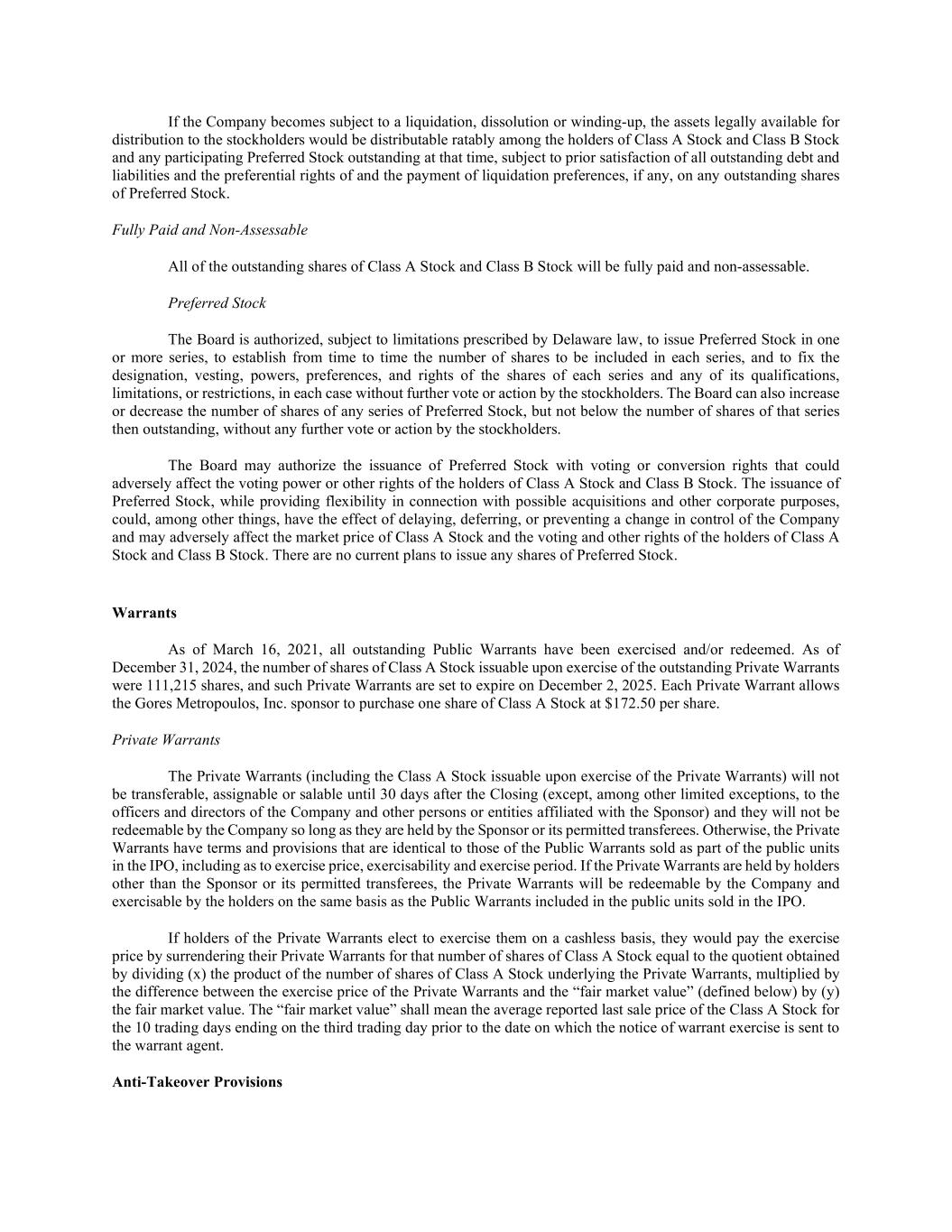
If the Company becomes subject to a liquidation, dissolution or winding-up, the assets legally available for distribution to the stockholders would be distributable ratably among the holders of Class A Stock and Class B Stock and any participating Preferred Stock outstanding at that time, subject to prior satisfaction of all outstanding debt and liabilities and the preferential rights of and the payment of liquidation preferences, if any, on any outstanding shares of Preferred Stock. Fully Paid and Non-Assessable All of the outstanding shares of Class A Stock and Class B Stock will be fully paid and non-assessable. Preferred Stock The Board is authorized, subject to limitations prescribed by Delaware law, to issue Preferred Stock in one or more series, to establish from time to time the number of shares to be included in each series, and to fix the designation, vesting, powers, preferences, and rights of the shares of each series and any of its qualifications, limitations, or restrictions, in each case without further vote or action by the stockholders. The Board can also increase or decrease the number of shares of any series of Preferred Stock, but not below the number of shares of that series then outstanding, without any further vote or action by the stockholders. The Board may authorize the issuance of Preferred Stock with voting or conversion rights that could adversely affect the voting power or other rights of the holders of Class A Stock and Class B Stock. The issuance of Preferred Stock, while providing flexibility in connection with possible acquisitions and other corporate purposes, could, among other things, have the effect of delaying, deferring, or preventing a change in control of the Company and may adversely affect the market price of Class A Stock and the voting and other rights of the holders of Class A Stock and Class B Stock. There are no current plans to issue any shares of Preferred Stock. Warrants As of March 16, 2021, all outstanding Public Warrants have been exercised and/or redeemed. As of December 31, 2024, the number of shares of Class A Stock issuable upon exercise of the outstanding Private Warrants were 111,215 shares, and such Private Warrants are set to expire on December 2, 2025. Each Private Warrant allows the Gores Metropoulos, Inc. sponsor to purchase one share of Class A Stock at $172.50 per share. Private Warrants The Private Warrants (including the Class A Stock issuable upon exercise of the Private Warrants) will not be transferable, assignable or salable until 30 days after the Closing (except, among other limited exceptions, to the officers and directors of the Company and other persons or entities affiliated with the Sponsor) and they will not be redeemable by the Company so long as they are held by the Sponsor or its permitted transferees. Otherwise, the Private Warrants have terms and provisions that are identical to those of the Public Warrants sold as part of the public units in the IPO, including as to exercise price, exercisability and exercise period. If the Private Warrants are held by holders other than the Sponsor or its permitted transferees, the Private Warrants will be redeemable by the Company and exercisable by the holders on the same basis as the Public Warrants included in the public units sold in the IPO. If holders of the Private Warrants elect to exercise them on a cashless basis, they would pay the exercise price by surrendering their Private Warrants for that number of shares of Class A Stock equal to the quotient obtained by dividing (x) the product of the number of shares of Class A Stock underlying the Private Warrants, multiplied by the difference between the exercise price of the Private Warrants and the “fair market value” (defined below) by (y) the fair market value. The “fair market value” shall mean the average reported last sale price of the Class A Stock for the 10 trading days ending on the third trading day prior to the date on which the notice of warrant exercise is sent to the warrant agent. Anti-Takeover Provisions
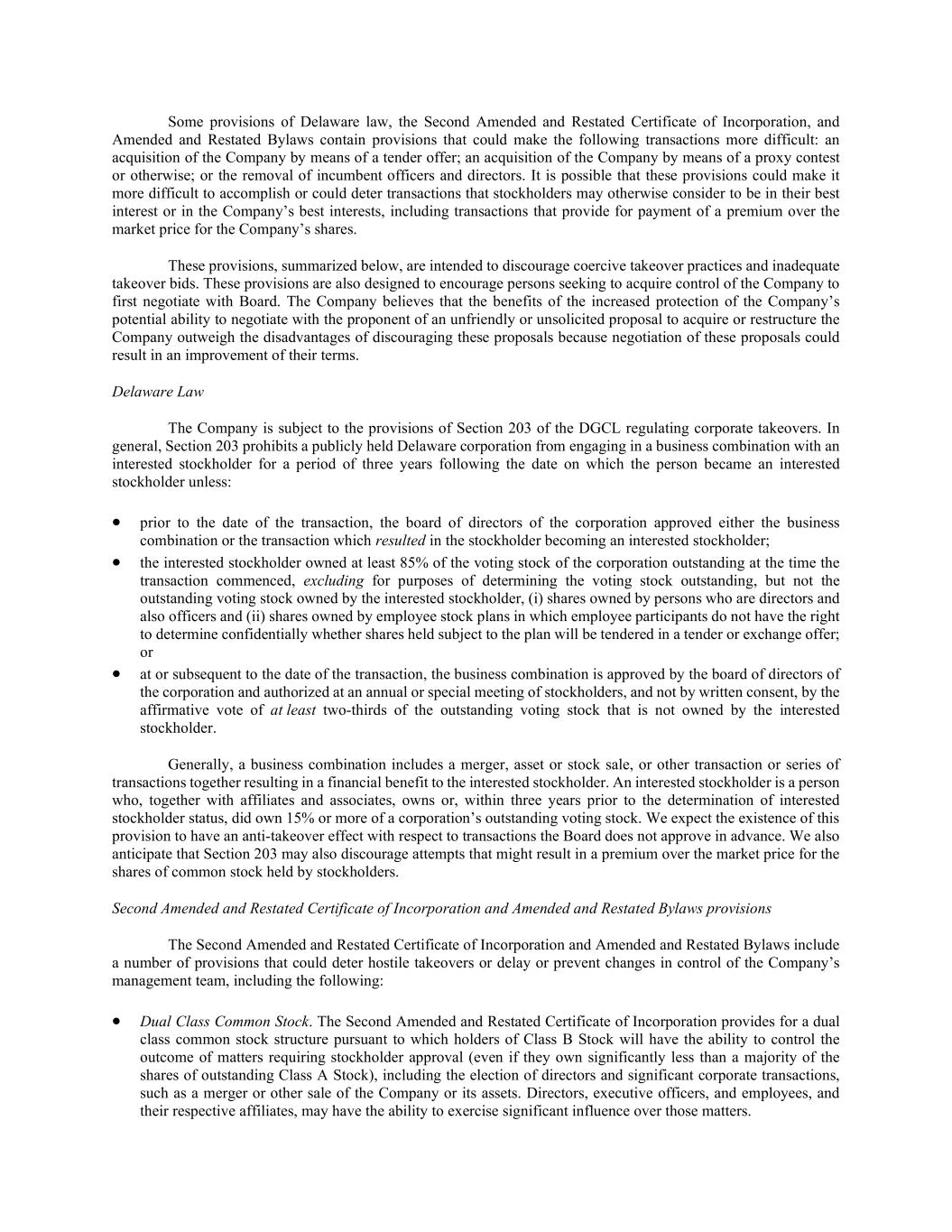
Some provisions of Delaware law, the Second Amended and Restated Certificate of Incorporation, and Amended and Restated Bylaws contain provisions that could make the following transactions more difficult: an acquisition of the Company by means of a tender offer; an acquisition of the Company by means of a proxy contest or otherwise; or the removal of incumbent officers and directors. It is possible that these provisions could make it more difficult to accomplish or could deter transactions that stockholders may otherwise consider to be in their best interest or in the Company’s best interests, including transactions that provide for payment of a premium over the market price for the Company’s shares. These provisions, summarized below, are intended to discourage coercive takeover practices and inadequate takeover bids. These provisions are also designed to encourage persons seeking to acquire control of the Company to first negotiate with Board. The Company believes that the benefits of the increased protection of the Company’s potential ability to negotiate with the proponent of an unfriendly or unsolicited proposal to acquire or restructure the Company outweigh the disadvantages of discouraging these proposals because negotiation of these proposals could result in an improvement of their terms. Delaware Law The Company is subject to the provisions of Section 203 of the DGCL regulating corporate takeovers. In general, Section 203 prohibits a publicly held Delaware corporation from engaging in a business combination with an interested stockholder for a period of three years following the date on which the person became an interested stockholder unless: prior to the date of the transaction, the board of directors of the corporation approved either the business combination or the transaction which resulted in the stockholder becoming an interested stockholder; the interested stockholder owned at least 85% of the voting stock of the corporation outstanding at the time the transaction commenced, excluding for purposes of determining the voting stock outstanding, but not the outstanding voting stock owned by the interested stockholder, (i) shares owned by persons who are directors and also officers and (ii) shares owned by employee stock plans in which employee participants do not have the right to determine confidentially whether shares held subject to the plan will be tendered in a tender or exchange offer; or at or subsequent to the date of the transaction, the business combination is approved by the board of directors of the corporation and authorized at an annual or special meeting of stockholders, and not by written consent, by the affirmative vote of at least two-thirds of the outstanding voting stock that is not owned by the interested stockholder. Generally, a business combination includes a merger, asset or stock sale, or other transaction or series of transactions together resulting in a financial benefit to the interested stockholder. An interested stockholder is a person who, together with affiliates and associates, owns or, within three years prior to the determination of interested stockholder status, did own 15% or more of a corporation’s outstanding voting stock. We expect the existence of this provision to have an anti-takeover effect with respect to transactions the Board does not approve in advance. We also anticipate that Section 203 may also discourage attempts that might result in a premium over the market price for the shares of common stock held by stockholders. Second Amended and Restated Certificate of Incorporation and Amended and Restated Bylaws provisions The Second Amended and Restated Certificate of Incorporation and Amended and Restated Bylaws include a number of provisions that could deter hostile takeovers or delay or prevent changes in control of the Company’s management team, including the following: Dual Class Common Stock. The Second Amended and Restated Certificate of Incorporation provides for a dual class common stock structure pursuant to which holders of Class B Stock will have the ability to control the outcome of matters requiring stockholder approval (even if they own significantly less than a majority of the shares of outstanding Class A Stock), including the election of directors and significant corporate transactions, such as a merger or other sale of the Company or its assets. Directors, executive officers, and employees, and their respective affiliates, may have the ability to exercise significant influence over those matters.
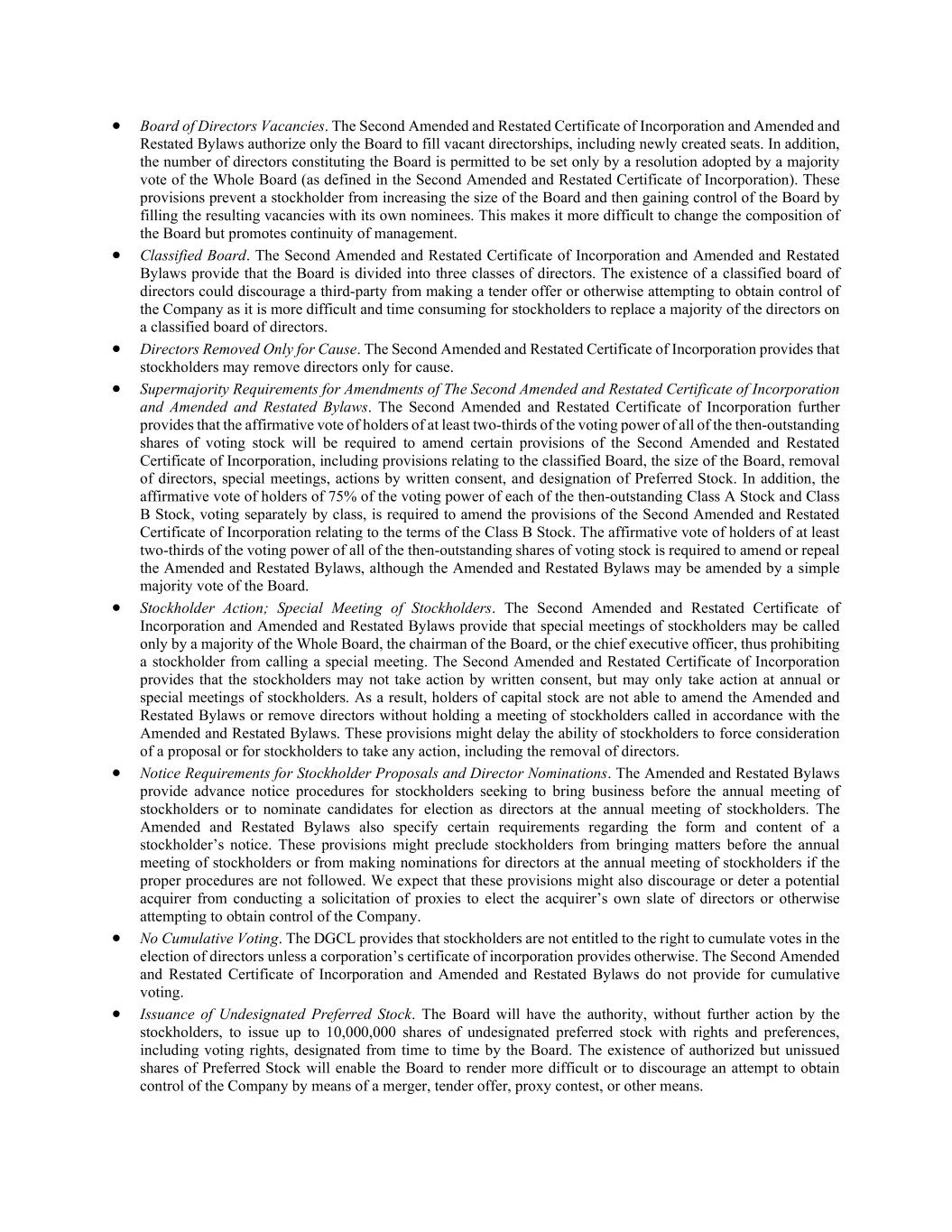
Board of Directors Vacancies. The Second Amended and Restated Certificate of Incorporation and Amended and Restated Bylaws authorize only the Board to fill vacant directorships, including newly created seats. In addition, the number of directors constituting the Board is permitted to be set only by a resolution adopted by a majority vote of the Whole Board (as defined in the Second Amended and Restated Certificate of Incorporation). These provisions prevent a stockholder from increasing the size of the Board and then gaining control of the Board by filling the resulting vacancies with its own nominees. This makes it more difficult to change the composition of the Board but promotes continuity of management. Classified Board. The Second Amended and Restated Certificate of Incorporation and Amended and Restated Bylaws provide that the Board is divided into three classes of directors. The existence of a classified board of directors could discourage a third-party from making a tender offer or otherwise attempting to obtain control of the Company as it is more difficult and time consuming for stockholders to replace a majority of the directors on a classified board of directors. Directors Removed Only for Cause. The Second Amended and Restated Certificate of Incorporation provides that stockholders may remove directors only for cause. Supermajority Requirements for Amendments of The Second Amended and Restated Certificate of Incorporation and Amended and Restated Bylaws. The Second Amended and Restated Certificate of Incorporation further provides that the affirmative vote of holders of at least two-thirds of the voting power of all of the then-outstanding shares of voting stock will be required to amend certain provisions of the Second Amended and Restated Certificate of Incorporation, including provisions relating to the classified Board, the size of the Board, removal of directors, special meetings, actions by written consent, and designation of Preferred Stock. In addition, the affirmative vote of holders of 75% of the voting power of each of the then-outstanding Class A Stock and Class B Stock, voting separately by class, is required to amend the provisions of the Second Amended and Restated Certificate of Incorporation relating to the terms of the Class B Stock. The affirmative vote of holders of at least two-thirds of the voting power of all of the then-outstanding shares of voting stock is required to amend or repeal the Amended and Restated Bylaws, although the Amended and Restated Bylaws may be amended by a simple majority vote of the Board. Stockholder Action; Special Meeting of Stockholders. The Second Amended and Restated Certificate of Incorporation and Amended and Restated Bylaws provide that special meetings of stockholders may be called only by a majority of the Whole Board, the chairman of the Board, or the chief executive officer, thus prohibiting a stockholder from calling a special meeting. The Second Amended and Restated Certificate of Incorporation provides that the stockholders may not take action by written consent, but may only take action at annual or special meetings of stockholders. As a result, holders of capital stock are not able to amend the Amended and Restated Bylaws or remove directors without holding a meeting of stockholders called in accordance with the Amended and Restated Bylaws. These provisions might delay the ability of stockholders to force consideration of a proposal or for stockholders to take any action, including the removal of directors. Notice Requirements for Stockholder Proposals and Director Nominations. The Amended and Restated Bylaws provide advance notice procedures for stockholders seeking to bring business before the annual meeting of stockholders or to nominate candidates for election as directors at the annual meeting of stockholders. The Amended and Restated Bylaws also specify certain requirements regarding the form and content of a stockholder’s notice. These provisions might preclude stockholders from bringing matters before the annual meeting of stockholders or from making nominations for directors at the annual meeting of stockholders if the proper procedures are not followed. We expect that these provisions might also discourage or deter a potential acquirer from conducting a solicitation of proxies to elect the acquirer’s own slate of directors or otherwise attempting to obtain control of the Company. No Cumulative Voting. The DGCL provides that stockholders are not entitled to the right to cumulate votes in the election of directors unless a corporation’s certificate of incorporation provides otherwise. The Second Amended and Restated Certificate of Incorporation and Amended and Restated Bylaws do not provide for cumulative voting. Issuance of Undesignated Preferred Stock. The Board will have the authority, without further action by the stockholders, to issue up to 10,000,000 shares of undesignated preferred stock with rights and preferences, including voting rights, designated from time to time by the Board. The existence of authorized but unissued shares of Preferred Stock will enable the Board to render more difficult or to discourage an attempt to obtain control of the Company by means of a merger, tender offer, proxy contest, or other means.
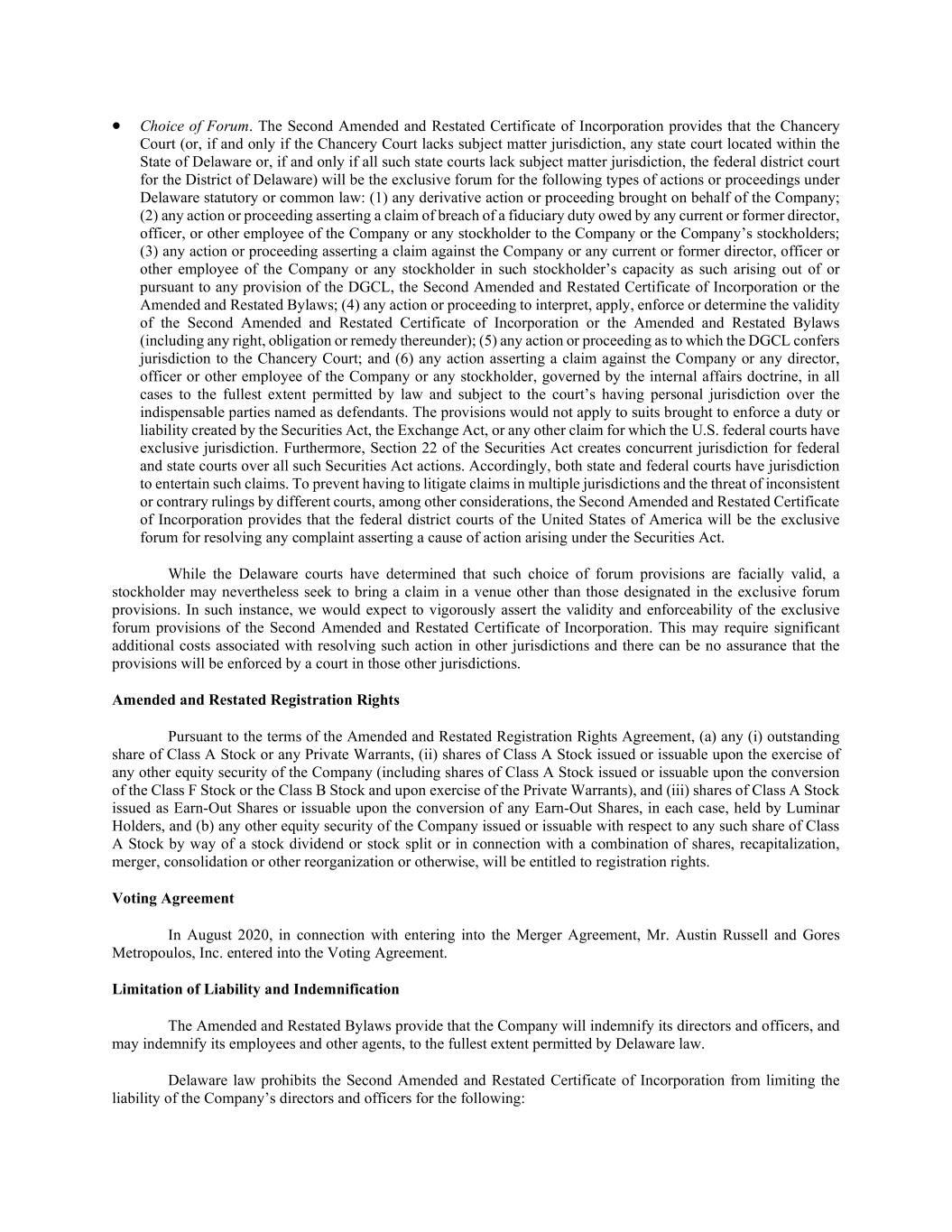
Choice of Forum. The Second Amended and Restated Certificate of Incorporation provides that the Chancery Court (or, if and only if the Chancery Court lacks subject matter jurisdiction, any state court located within the State of Delaware or, if and only if all such state courts lack subject matter jurisdiction, the federal district court for the District of Delaware) will be the exclusive forum for the following types of actions or proceedings under Delaware statutory or common law: (1) any derivative action or proceeding brought on behalf of the Company; (2) any action or proceeding asserting a claim of breach of a fiduciary duty owed by any current or former director, officer, or other employee of the Company or any stockholder to the Company or the Company’s stockholders; (3) any action or proceeding asserting a claim against the Company or any current or former director, officer or other employee of the Company or any stockholder in such stockholder’s capacity as such arising out of or pursuant to any provision of the DGCL, the Second Amended and Restated Certificate of Incorporation or the Amended and Restated Bylaws; (4) any action or proceeding to interpret, apply, enforce or determine the validity of the Second Amended and Restated Certificate of Incorporation or the Amended and Restated Bylaws (including any right, obligation or remedy thereunder); (5) any action or proceeding as to which the DGCL confers jurisdiction to the Chancery Court; and (6) any action asserting a claim against the Company or any director, officer or other employee of the Company or any stockholder, governed by the internal affairs doctrine, in all cases to the fullest extent permitted by law and subject to the court’s having personal jurisdiction over the indispensable parties named as defendants. The provisions would not apply to suits brought to enforce a duty or liability created by the Securities Act, the Exchange Act, or any other claim for which the U.S. federal courts have exclusive jurisdiction. Furthermore, Section 22 of the Securities Act creates concurrent jurisdiction for federal and state courts over all such Securities Act actions. Accordingly, both state and federal courts have jurisdiction to entertain such claims. To prevent having to litigate claims in multiple jurisdictions and the threat of inconsistent or contrary rulings by different courts, among other considerations, the Second Amended and Restated Certificate of Incorporation provides that the federal district courts of the United States of America will be the exclusive forum for resolving any complaint asserting a cause of action arising under the Securities Act. While the Delaware courts have determined that such choice of forum provisions are facially valid, a stockholder may nevertheless seek to bring a claim in a venue other than those designated in the exclusive forum provisions. In such instance, we would expect to vigorously assert the validity and enforceability of the exclusive forum provisions of the Second Amended and Restated Certificate of Incorporation. This may require significant additional costs associated with resolving such action in other jurisdictions and there can be no assurance that the provisions will be enforced by a court in those other jurisdictions. Amended and Restated Registration Rights Pursuant to the terms of the Amended and Restated Registration Rights Agreement, (a) any (i) outstanding share of Class A Stock or any Private Warrants, (ii) shares of Class A Stock issued or issuable upon the exercise of any other equity security of the Company (including shares of Class A Stock issued or issuable upon the conversion of the Class F Stock or the Class B Stock and upon exercise of the Private Warrants), and (iii) shares of Class A Stock issued as Earn-Out Shares or issuable upon the conversion of any Earn-Out Shares, in each case, held by Luminar Holders, and (b) any other equity security of the Company issued or issuable with respect to any such share of Class A Stock by way of a stock dividend or stock split or in connection with a combination of shares, recapitalization, merger, consolidation or other reorganization or otherwise, will be entitled to registration rights. Voting Agreement In August 2020, in connection with entering into the Merger Agreement, Mr. Austin Russell and Gores Metropoulos, Inc. entered into the Voting Agreement. Limitation of Liability and Indemnification The Amended and Restated Bylaws provide that the Company will indemnify its directors and officers, and may indemnify its employees and other agents, to the fullest extent permitted by Delaware law. Delaware law prohibits the Second Amended and Restated Certificate of Incorporation from limiting the liability of the Company’s directors and officers for the following:
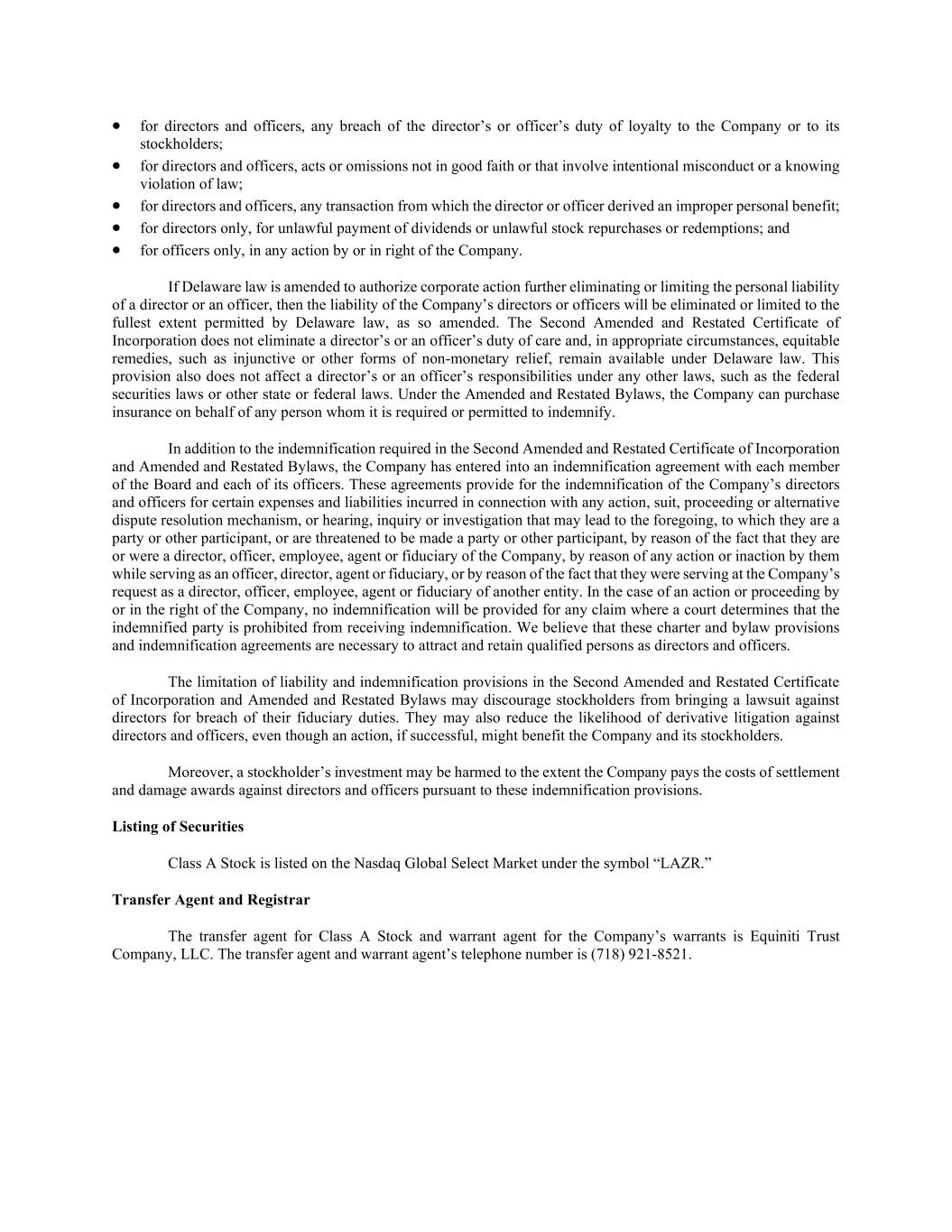
for directors and officers, any breach of the director’s or officer’s duty of loyalty to the Company or to its stockholders; for directors and officers, acts or omissions not in good faith or that involve intentional misconduct or a knowing violation of law; for directors and officers, any transaction from which the director or officer derived an improper personal benefit; for directors only, for unlawful payment of dividends or unlawful stock repurchases or redemptions; and for officers only, in any action by or in right of the Company. If Delaware law is amended to authorize corporate action further eliminating or limiting the personal liability of a director or an officer, then the liability of the Company’s directors or officers will be eliminated or limited to the fullest extent permitted by Delaware law, as so amended. The Second Amended and Restated Certificate of Incorporation does not eliminate a director’s or an officer’s duty of care and, in appropriate circumstances, equitable remedies, such as injunctive or other forms of non-monetary relief, remain available under Delaware law. This provision also does not affect a director’s or an officer’s responsibilities under any other laws, such as the federal securities laws or other state or federal laws. Under the Amended and Restated Bylaws, the Company can purchase insurance on behalf of any person whom it is required or permitted to indemnify. In addition to the indemnification required in the Second Amended and Restated Certificate of Incorporation and Amended and Restated Bylaws, the Company has entered into an indemnification agreement with each member of the Board and each of its officers. These agreements provide for the indemnification of the Company’s directors and officers for certain expenses and liabilities incurred in connection with any action, suit, proceeding or alternative dispute resolution mechanism, or hearing, inquiry or investigation that may lead to the foregoing, to which they are a party or other participant, or are threatened to be made a party or other participant, by reason of the fact that they are or were a director, officer, employee, agent or fiduciary of the Company, by reason of any action or inaction by them while serving as an officer, director, agent or fiduciary, or by reason of the fact that they were serving at the Company’s request as a director, officer, employee, agent or fiduciary of another entity. In the case of an action or proceeding by or in the right of the Company, no indemnification will be provided for any claim where a court determines that the indemnified party is prohibited from receiving indemnification. We believe that these charter and bylaw provisions and indemnification agreements are necessary to attract and retain qualified persons as directors and officers. The limitation of liability and indemnification provisions in the Second Amended and Restated Certificate of Incorporation and Amended and Restated Bylaws may discourage stockholders from bringing a lawsuit against directors for breach of their fiduciary duties. They may also reduce the likelihood of derivative litigation against directors and officers, even though an action, if successful, might benefit the Company and its stockholders. Moreover, a stockholder’s investment may be harmed to the extent the Company pays the costs of settlement and damage awards against directors and officers pursuant to these indemnification provisions. Listing of Securities Class A Stock is listed on the Nasdaq Global Select Market under the symbol “LAZR.” Transfer Agent and Registrar The transfer agent for Class A Stock and warrant agent for the Company’s warrants is Equiniti Trust Company, LLC. The transfer agent and warrant agent’s telephone number is (718) 921-8521.